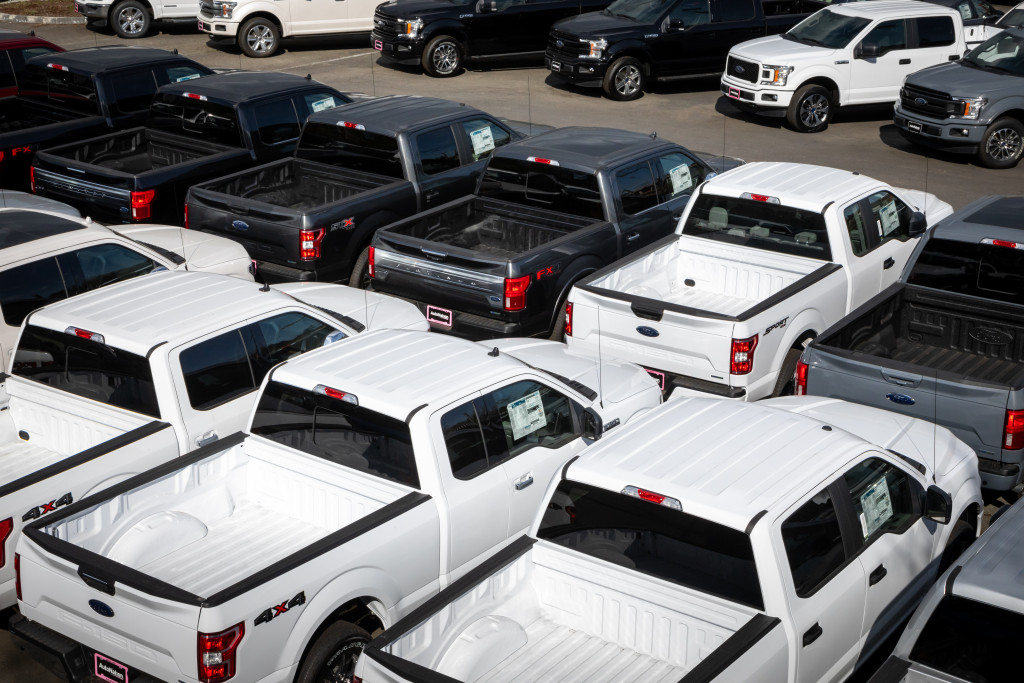
- When buying a truck, decide between a new or used model based on your budget, needs, and the truck’s reliability.
- Prioritize the truck’s reliability over its warranty and consider its purpose and the strain it will be under.
- Budgeting should include all costs associated with owning a truck, not just the purchase price, and consider financing options.
- Always get the truck inspected by a reliable mechanic and choose the right truck for your hauling needs by considering the weight and volume of the items you’ll regularly transport.
When buying a truck for the first time, it’s extremely important to ensure you’re making an investment worth every penny. Understanding the ins and outs of the truck market, your budget, and your specific needs can help you secure a reliable and cost-effective truck. Delve into some of the best tips to guide your first truck-buying experience and help you get the most value for your money.
Decide on a New or Used Truck
One of the first decisions you’ll need to make when buying your first truck is whether to invest in a new model or opt for a used one. Here are some tips:
Choose Options Wisely
Buying a new or used truck depends largely on your budget and needs. New trucks offer the latest features, warranties, and the assurance of a completely untouched vehicle. However, they have a steeper price tag and tend to depreciate quicker than used trucks.
On the other hand, used trucks are generally less expensive, offering decent performance at a fraction of the cost of a new one. However, they may have potential mechanical issues and lack the latest features.
Always remember to check the history of a used truck and have it inspected by a mechanic before purchasing. Whether you buy new or used, it’s crucial to analyze your needs, conduct thorough research, and consult professionals to find the best option.
Reputation of the Dealer
The dealer’s reputation is incredibly significant when buying a truck, especially a used one. A reputable used truck dealer assures a buyer about the quality and condition of the vehicle. Renowned dealers often have various options, offering detailed histories of the used trucks in their inventory.
They typically have stringent quality checks to ensure customers receive trucks in good condition. Moreover, reputable dealers are more likely to offer post-sale services and support, which can be invaluable for first-time truck buyers.
It’s advisable to read reviews, check ratings, and seek recommendations before choosing a dealer. Your experience with your dealer can greatly influence your overall satisfaction with your truck purchase, so it’s worth investing time in finding a trustworthy source.
Reliability Over Warranty
While warranties can provide peace of mind, the reliability of a truck should be a primary consideration. A truck with a history of dependability can drastically reduce the frequency and cost of repairs over time, even if it doesn’t come with an extensive warranty.
Researching the model’s reliability ratings and reviews from other owners can offer insights into common issues and the truck’s longevity. Consider the truck’s purpose – if it’s for heavy-duty tasks, you need one that can withstand the strain.
Similarly, fuel efficiency and comfort are paramount if your truck is for long-haul journeys. A reliable truck means less downtime, lower maintenance costs, and a vehicle that can hold its value over time. A reliable truck can save you from headaches and ensure a smooth, efficient driving experience.
Budgeting

Budgeting is a crucial aspect of the truck-buying process. It dictates whether you opt for a new or a used model, and also influences the truck’s size, features, and brand. When setting your budget, consider all costs of owning a truck, not just the purchase price. This includes insurance, fuel, maintenance, and potential repair costs. It’s advisable to allocate part of your budget for unexpected repairs and maintenance, especially if you opt for a used truck.
Moreover, consider the financing options available. If you plan to get a loan, factor in the interest rates and monthly payments to ensure they align with your income and expenses. A well-planned, comprehensive budget can provide a clear financial framework, helping to guide your decision and prevent future financial strain. Remember, a truck is an investment; make sure it’s one you can afford to keep in the long run.
Mechanic Inspection

Whether buying a new or used truck, getting it inspected by a reliable mechanic is essential. This step provides an expert opinion about the vehicle’s condition, allowing you to make an informed purchase decision. The mechanic will check various aspects of the truck, including the engine, suspension, brakes, and overall structural integrity, identifying any existing or potential issues.
A mechanic can also verify the accuracy of the truck’s history report for used trucks, ensuring no hidden faults. While this service comes at a cost, it could save you from significant repair expenses in the future. Therefore, before finalizing your purchase, schedule a thorough inspection with a trusted mechanic to ensure that your investment is mechanically sound and worth the asking price.
Right Truck for Your Hauling Needs
Assessing your hauling needs is an integral part of the truck-buying process. Understanding the weight and volume of the items you’ll regularly transport can help guide your truck choice. Lighter loads can be handled by smaller, more fuel-efficient trucks, while heavier or bulkier items may necessitate a larger truck with a more powerful engine and sturdier suspension.
Consider the terrain you’ll cover – rough off-road conditions may require a truck with four-wheel drive and increased ground clearance. Also, consider the frequency of your hauling needs; if you’re using your truck for daily heavy-duty tasks, investing in a more durable and reliable model may be wise.
Ensure to check the truck’s payload and towing capacity – these should exceed your needs to avoid overloading and damaging the vehicle. Ultimately, the right truck for your hauling needs will offer power, durability, and efficiency.
In conclusion, buying your first truck demands careful consideration of several factors. Remember to balance your budget, needs, and the truck’s reliability to make a well-informed decision. Now, it’s your turn to research, plan, and take the next big step toward owning your first truck. Happy truck hunting!




